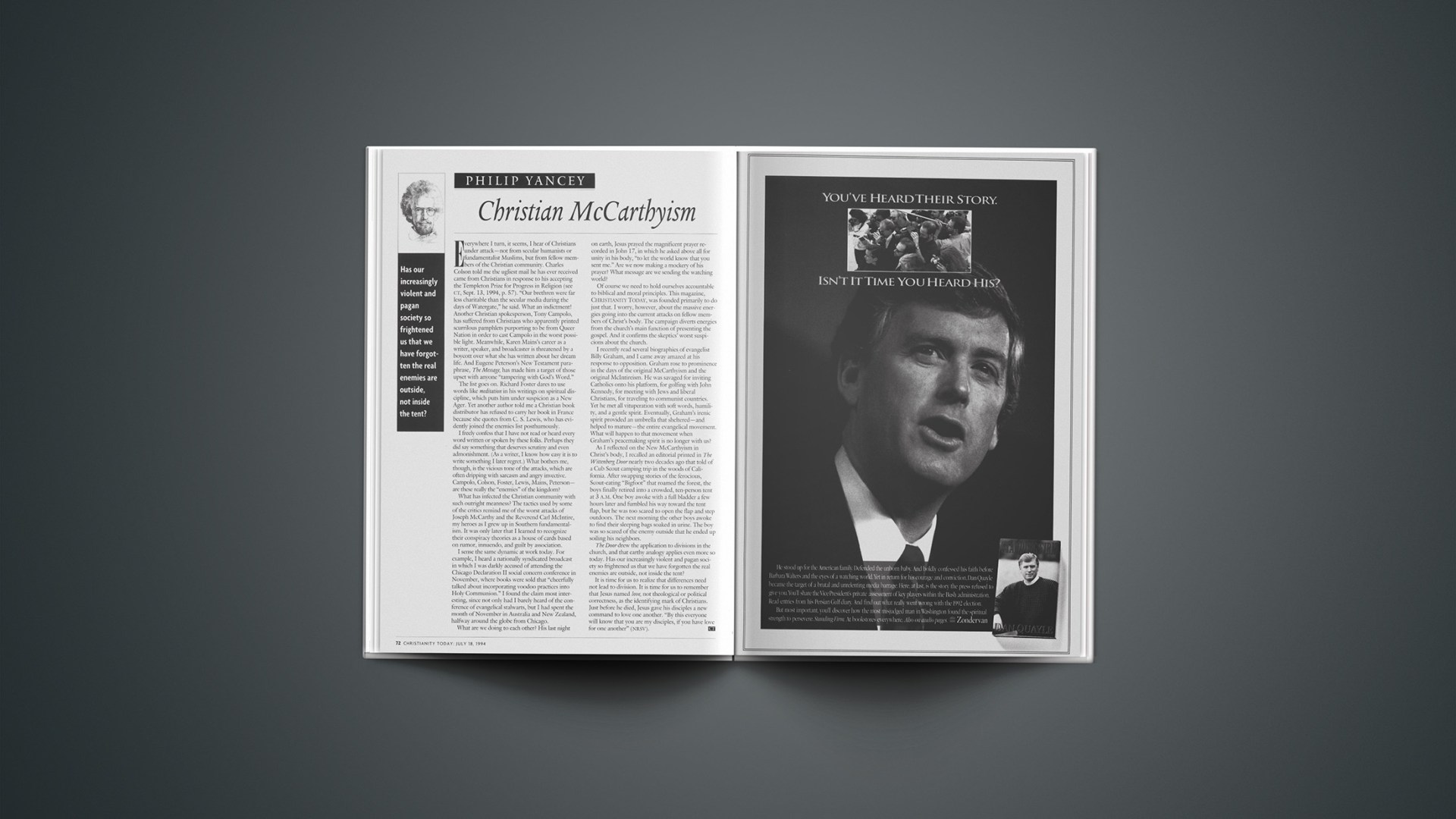Everywhere I turn, it seems, I hear of Christians under attack—not from secular humanists or fundamentalist Muslims, but from fellow members of the Christian community. Charles Colson told me the ugliest mail he has ever received came from Christians in response to his accepting the Templeton Prize for Progress in Religion (see CT, Sept. 13, 1994, p. 57). “Our brethren were far less charitable than the secular media during the days of Watergate,” he said. What an indictment! Another Christian spokesperson, Tony Campolo, has suffered from Christians who apparently printed scurrilous pamphlets purporting to be from Queer Nation in order to cast Campolo in the worst possible light. Meanwhile, Karen Mains’s career as a writer, speaker, and broadcaster is threatened by a boycott over what she has written about her dream life. And Eugene Peterson’s New Testament paraphrase, “The Message,” has made him a target of those upset with anyone “tampering with God’s Word.”
The list goes on. Richard Foster dares to use words like meditation in his writings on spiritual discipline, which puts him under suspicion as a New Ager. Yet another author told me a Christian book distributor has refused to carry her book in France because she quotes from C. S. Lewis, who has evidently joined the enemies list posthumously.
I freely confess that I have not read or heard every word written or spoken by these folks. Perhaps they did say something that deserves scrutiny and even admonishment. (As a writer, I know how easy it is to write something I later regret.) What bothers me, though, is the vicious tone of the attacks, which are often dripping with sarcasm and angry invective. Campolo, Colson, Foster, Lewis, Mains, Peterson-are these really the “enemies” of the kingdom?
What has infected the Christian community with such outright meanness? The tactics used by some of the critics remind me of the worst attacks of Joseph McCarthy and the Reverend Carl McIntire, my heroes as I grew up in Southern fundamentalism. It was only later that I learned to recognize their conspiracy theories as a house of cards based on rumor, innuendo, and guilt by association.
I sense the same dynamic at work today. For example, I heard a nationally syndicated broadcast in which I was darkly accused of attending the Chicago Declaration II social concern conference in November, where books were sold that “cheerfully talked about incorporating voodoo practices into Holy Communion.” I found the claim most interesting since not only had I barely heard of the conference of evangelical stalwarts, but I had spent the month of November in Australia and New Zealand, halfway around the globe from Chicago.
What are we doing to each other? His last night on earth, Jesus prayed the magnificent prayer recorded in John 17, in which he asked above all for unity in his body “to let the world know that you sent me.” Are we now making a mockery of his prayer? What message are we sending the watching world?
Of course we need to hold ourselves accountable to biblical and moral principles. This magazine, CHRISTIANITY TODAY, was founded primarily to do just that. I worry, however, about the massive energies going into the current attacks on fellow members of Christ’s body. The campaign diverts energies from the church’s main function of presenting the gospel. And it confirms the skeptics’ worst suspicions about the church.
I recently read several biographies of evangelist Billy Graham, and I came away amazed at his response to opposition. Graham rose to prominence in the days of the original McCarthyism and the original McIntireism. He was savaged for inviting Catholics onto his platform, for golfing with John Kennedy, for meeting with Jews and liberal Christians, for traveling to communist countries. Yet he met all vituperation with soft words, humility, and a gentle spirit. Eventually, Graham’s irenic spirit provided an umbrella that sheltered—and helped to mature—the entire evangelical movement. What will happen to that movement when Graham’s peacemaking spirit is no longer with us?
As I reflected on the New McCarthyism in Christ’s body, I recalled an editorial printed in The Wittenberg Door nearly two decades ago that told of a Cub Scout camping trip in the woods of California. After swapping stories of the ferocious, Scout-eating “Bigfoot” that roamed the forest, the boys finally retired into a crowded, ten-person tent at 3 A.M. One boy awoke with a full bladder a few hours later and fumbled his way toward the tent flap, but he was too scared to open the flap and step outdoors. The next morning the other boys awoke to find their sleeping bags soaked in urine. The boy was so scared of the enemy outside that he ended up soiling his neighbors.
The Door drew the application to divisions in the church, and that earthy analogy applies even more so today. Has our increasingly violent and pagan society so frightened us that we have forgotten the real enemies are outside, not inside the tent?
It is time for us to realize that differences need not lead to division. It is time for us to remember that Jesus named love, not theological or political correctness, as the identifying mark of Christians. Just before he died, Jesus gave his disciples a new command to love one another. “By this everyone will know that you are my disciples, if you have love for one another” (NRSV).
Copyright © 1994 Christianity Today. Click for reprint information.
ctjul94mrw4T80185619










